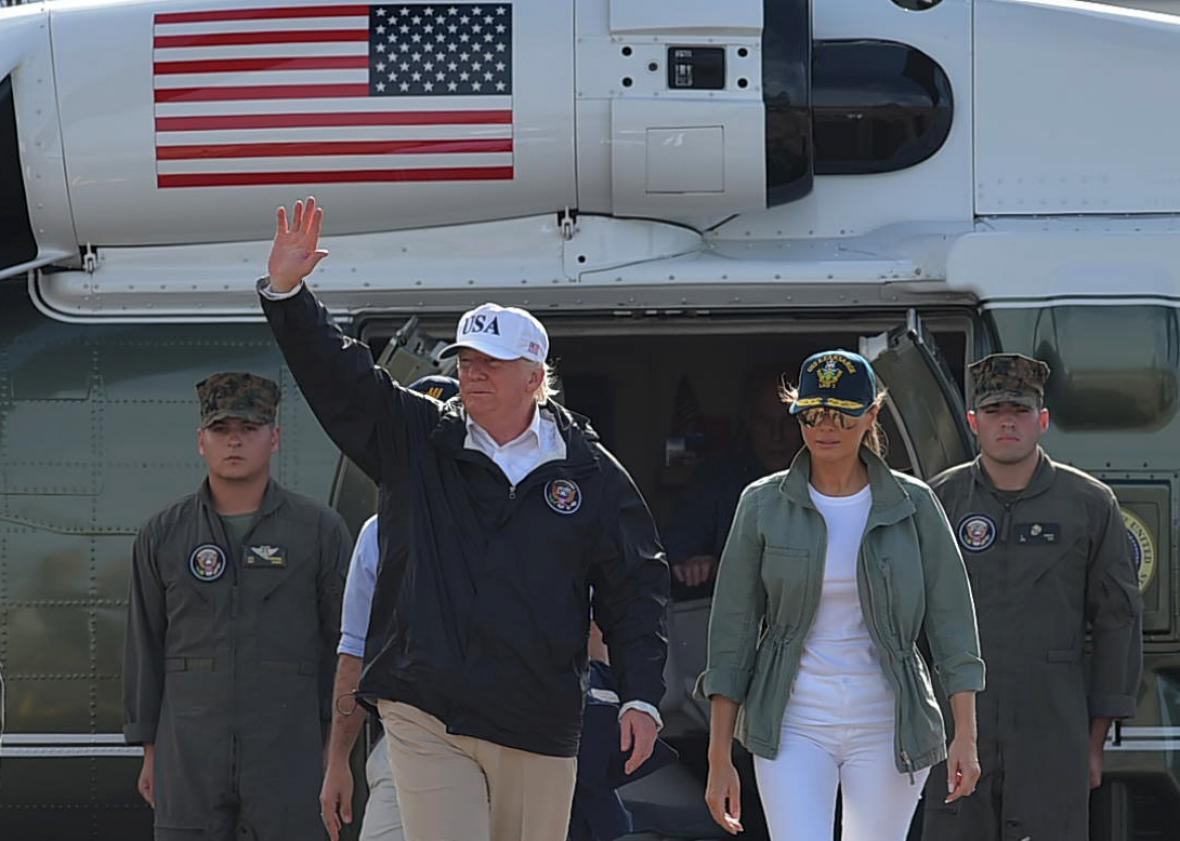Three weeks in to the humanitarian crisis in storm-ravaged Puerto Rico, President Trump has gotten bored with providing relief and moved on to obsessing about the public appraisal of the relief he has (and mostly hasn’t) provided. His stamina for self-celebration is unsurpassed; he touts, with a relentless sense of duty, the swiftness and efficacy of the measures his White House has taken to lift the island out of ruin. “Nobody’s ever seen anything like it,” Trump said, of the devastation wrought by Hurricane Maria. Yet, as he tweeted later, “despite the Fake News Media in conjunction with the Dems, an amazing job is being done in Puerto Rico.”
In addition to glorying in his own leadership and blaming the snarls of rebuilding on CNN and the left, a darker theme has emerged in Trump’s handling of the catastrophe, with its climbing death toll (now at 45), broken power grids, and shortages of food and water. The president has in recent days affected a kind of sinister swaying to and fro on the question of whether the American government will continue to offer assistance to 3.4 million of its own citizens. On Thursday morning, he tweeted that “we cannot keep FEMA, the Military & the First Responders, who have been amazing (under the most difficult circumstances) in P.R. forever!”
And why would we want to help the people of Puerto Rico? They are engulfed “in a financial crisis largely of their own making,” Trump wrote. They’ve shown “a total lack of accountability … Electric and all infrastructure was disaster before hurricanes.” A few weeks ago, the commander in chief opined about “such poor leadership ability by the Mayor of San Juan, and others in Puerto Rico, who are not able to get their workers to help.” These people “want everything to be done for them when it should be a community effort,” he complained. Also, as he confided to a crowd of refugees in the island’s capital city, the need to address Maria’s damage has rudely “thrown [the U.S.] budget a little out of whack.”
But also, anyone who believes the kind and glorious Trump will not fix Puerto Rico is a lying louse. Trump told a group of Washington manufacturers in September that “we will not rest … until the people of Puerto Rico are safe. These are great people.” He promised that “the departments of Homeland Security and Defense are engaged fully in the disaster and the response and recovery effort.” The next day, he tweeted words of encouragement at Puerto Ricans.
The whiplash of Trump’s response here can’t be chalked up to impulsivity or forgetfulness. The president is luxuriating in his power both to save lives and condemn them. Like an emperor deliberating over whether to give the gladiator lying prone before him a thumbs up or a thumbs down, Trump is making a show of his sway over others’ fates, his unique power to render or withhold support from the desperate and helpless. All the usual Trump observations apply: He is transforming a national issue into a personal one; he is flattering his ego rather than serving the country. But there is something especially sick about this exercise of power for its own sake. Trump, cradling a territory like a wounded animal, might choose to crush it in his palm, just because he can.
The tantalizing and awful theater of this high-stakes decision-making enthralls the president. Examining every claim Puerto Rico can make on U.S. aid, accounting for the island’s preexisting debt, assessing the worthiness of the governor and mayors—here is all the intoxicating choreography of leadership and none of the heart. For Trump, relishing the suspense he’s creating, these will-he-or-won’t-he wobbles are expressions of a deeper malice. His lament that Hurricane Maria has derailed the federal budget dressed his sadism up in cool, Olympian judgment. The common folk were begging for their lives, but he had a deficit to consider. Could he in good conscience afford to send more help? Hmm—he’s going to need to get back to us on that one.
A simplistic thinker if ever one lived, Trump has a pattern of equivocating on matters that repel nuance. He ventured that some of the participants in a white supremacist rally were “very fine people.” Now he is waffling on whether hurricane victims deserve the resources of their own federal government.
It shouldn’t surprise us that the president would linger over the myriad branching “complications” of saving Puerto Rico. Many of his grand pronouncements don’t chime with reality. Consider his threat to revoke NBC’s broadcasting license, which a commissioner on the Federal Communications Commission summarily shut down. In hurricane relief, though, the president has discovered a lever susceptible to the shifts in his moods. He can regulate the flow of supplies to desperate Americans after a cataclysmic storm, which means he can write these people’s fates with extreme precision.
Clearly, the vulnerability of his own citizens is an irresistible lure. It is not enough for Trump to praise himself for delivering Puerto Ricans from danger, even when what he’s doing is distributing basic supplies—this president can transform the clearing of the lowest possible bar into a feat of benevolence. He must also preserve his capacity to hurt and subdue. Sparing the gladiator looks so much more impressive when the emperor could have just as easily had him killed. And anyway, who cares what happens to the guy in the ring? Trump just wants to remind us who has the mighty thumbs.
